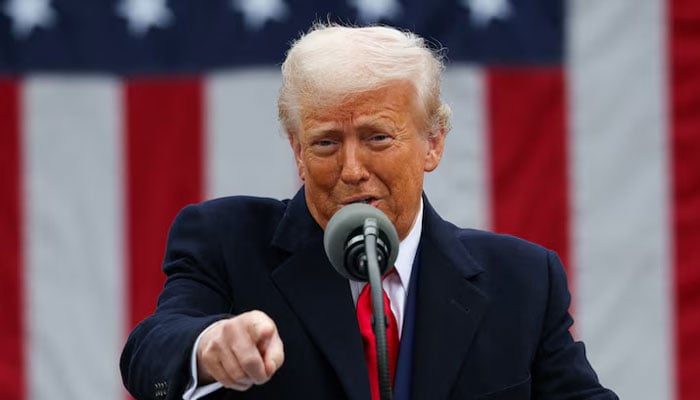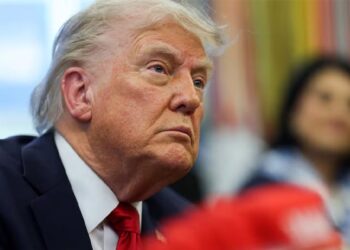
US President Donald Trump addressing tariff policies in the Rose Garden of the White House, Washington, DC, April 2, 2025. — Reuters
On Sunday, US Secretary of Commerce Howard Lutnick revealed that certain electronic items, such as smartphones and computers that were temporarily exempt from new tariffs, will soon be subject to additional duties, according to a report by Reuters.
During an appearance on ABC’s This Week, Lutnick stated that the administration plans to implement “a special focus-type of tariff” within the next month or two. This new duty will affect semiconductors, pharmaceuticals, and various electronic devices that are not included under the existing steep reciprocal tariffs currently set at 125%.
“Although they are currently exempt from the reciprocal tariffs, they will fall under the semiconductor tariffs that are likely to be implemented soon,” Lutnick explained.
He underscored the importance of these products for national security and emphasized the need for domestic manufacturing: “These items are crucial for national security and should be produced in America.”
Just last Friday, the Trump administration had excluded numerous tech products from the reciprocal tariffs, providing a temporary reprieve for companies like Apple and Dell. However, Lutnick’s remarks suggest that this relief might be short-lived.
Trump’s evolving strategy has caused fluctuations in the market, resulting in significant volatility and a decline of over 10% in the S&P 500 since January. Analysts note that the constant changes complicate business and investment planning.
These comments from Lutnick came on the heels of an announcement from the administration about a forthcoming national security investigation into semiconductors. In retaliation, China, which had raised its tariffs to 125%, indicated it is reviewing the US exemptions for tech products.
“Only the person who tied the bell around the tiger’s neck can untie it,” remarked China’s Ministry of Commerce.
Billionaire investor Bill Ackman called on Trump to pause tariffs on China for 90 days, a move similar to the temporary relief granted to other nations. “This would accomplish the same goal… without the associated disruption and risks,” Ackman noted on X.
Market strategist Sven Henrich criticized the inconsistent messaging. “If Lutnick gets fired, it could trigger the year’s biggest rally,” he stated. “US businesses cannot plan or invest amidst this constant back-and-forth.”
Democratic Senator Elizabeth Warren also criticized the lack of a coherent policy. “There is no clear tariff strategy—just chaos and corruption,” she said.
The notice from US Customs and Border Protection outlined 20 categories of tech products, including computers, memory chips, and displays, that are exempt from tariffs, although a 20% tariff related to the fentanyl crisis remains in place.
White House adviser Peter Navarro confirmed that outreach efforts are underway with several allies, but not China. Meanwhile, Trade Representative Jamieson Greer mentioned that Trump currently has no plans to communicate with President Xi but aims to secure trade agreements with non-Chinese partners soon. “I want to finalize meaningful deals within 90 days,” he stated.
Ray Dalio issued a warning about potential economic repercussions: “We are at a crucial decision-making moment and very close to a recession. I’m worried about something even worse if this situation isn’t managed properly.”




